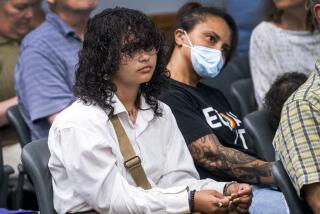Balancing Student Health, Privacy
- Share via
When my mother’s generation went to college, parents sent their sons and daughters off knowing that strict dress codes, curfews and rules of conduct were the order of the day. Universities operated under the mandate of in loco parentis, “in place of a parent, with a parent’s duties and responsibilities.”
My generation, the baby boomers, triggered a radical change in the relationship between students and university administrators. Co-ed dorms became the norm, and college became the gateway to adulthood, independence and freedom.
Today, as the boomers’ children set off for college, whispers of in loco parentis again are being heard. Parents of this generation have, for a multitude of reasons, been more involved in their children’s lives on a daily basis than parents in the past. This involvement is changing relationships between families and universities once again.
Efforts to preserve students’ independence can lead to parental anger and legal action if something happens to a legally adult student, with parents feeling that a college reneged on its unstated “parental responsibilities.” And, even if they may not have been equipped to truly assist a troubled student or might even have exacerbated his problems, many parents feel that they should be notified by the college and involved in their adult children’s concerns.
Of course, an 18-year-old student may not want Mom or Dad in the picture.
The issue becomes even more complex when patient privacy is at stake. Prohibited by law from releasing medical information without patient permission, a doctor faces an ethical dilemma when potentially helpful family involvement is declined by a patient. Notifying a parent about an illness of an adult child could lead to disciplinary action or loss of license. Not involving a family, however, may deny a troubled patient a critical resource for his or her recovery ... and the result could be tragic.
Doctors like me, who work on a daily basis with young college students, are often faced with a difficult choice.
“Penny” was an A student. Her intelligence, determination and diligence had led to her acceptance and success at a top university. Twenty years old, energetic and friendly, with just a hint of shyness, she was well-liked by classmates, professors, roommates and friends--roommates and friends who urged her to visit the university’s student health service.
Expecting a routine physical, I wasn’t surprised when all the answers to my medical history questions came back normal. It was only when I saw Penny in the exam room, her baggy sweatshirt and slacks replaced by a thin paper gown that I realized why her friends had been so concerned. Penny’s bones prominently outlined her emaciated body, her anorexia nervosa no longer hidden by her outfits.
Patients with anorexia may in some cases get better with medication and outpatient psychotherapy, but those with severe illness generally need hospitalization in a specialized treatment program. Getting severely ill patients to take that step is often difficult. Some may be ashamed and unwilling to admit to their need for care and treatment; others may be in denial, convinced they are fine or even “fat.”
My medical evaluation showed that Penny’s condition was serious and that hospitalization was needed to prevent serious or fatal complications. But, for Penny, hospitalization meant she’d have to interrupt her studies, temporarily leave school and, worst of all, involve her family, whose insurance would be needed to cover the costs of her inpatient stay. Penny listened politely as I advised her that without inpatient treatment, she risked getting worse or dying, but she refused to consider going to the hospital or notifying her parents of her condition. And Penny was over 18.
Privacy laws ensuring patient-doctor confidentiality do allow for exceptions when a patient is in danger of harming himself or others. A patient who threatens suicide can be hospitalized against his will for up to 72 hours in a psychiatric unit, allowing for necessary treatment to prevent death. But, barring imminent patient suicide or homicide, a doctor cannot release a patient’s medical information without his or her permission. Penny, who was articulate, lucid, successful and, aside from her eating disorder, highly functional, had the right to refuse my recommendations--and, legally, my hands were tied. I couldn’t contact her family and let them know that they might be able to help Penny get better. As an adult, Penny could choose to ignore my recommendations, leave my office and never return. Would I run across Penny’s name again on the honor roll or on the critical list?
Even though I believed Penny would benefit most from hospitalization, my only choice at the time was to convince Penny to consider initial outpatient treatment. With her consent, I arranged for her to begin outpatient psychiatric and nutritional therapy at school, and asked her to return to my office regularly, hoping that with time she would become more open to discussing her anorexia with her parents and enter the recommended inpatient program. Fortunately, after a few weeks of counseling, Penny became more receptive to a mediated communication with her family--she invited her parents to meet with us, discuss her illness, and help her begin more intensive steps to recovery.
The outcome could have been different. Like many other adult students at risk of anorexia, bulimia, alcohol abuse, drug addiction, depression or other conditions, Penny might have refused further care. Her anorexia might have continued to worsen, and her parents might have had a harsher reality to face than Penny’s anorexia--like her death. Penny was fortunate that she made the decision to move forward with the treatment she needed and involve her family. And, as her physician, so was I.
*
Dr. Linda Reid Chassiakos is director of the Student Health Center at Cal State Northridge and a clinical assistant professor of pediatrics at UCLA.
More to Read
Sign up for Essential California
The most important California stories and recommendations in your inbox every morning.
You may occasionally receive promotional content from the Los Angeles Times.













